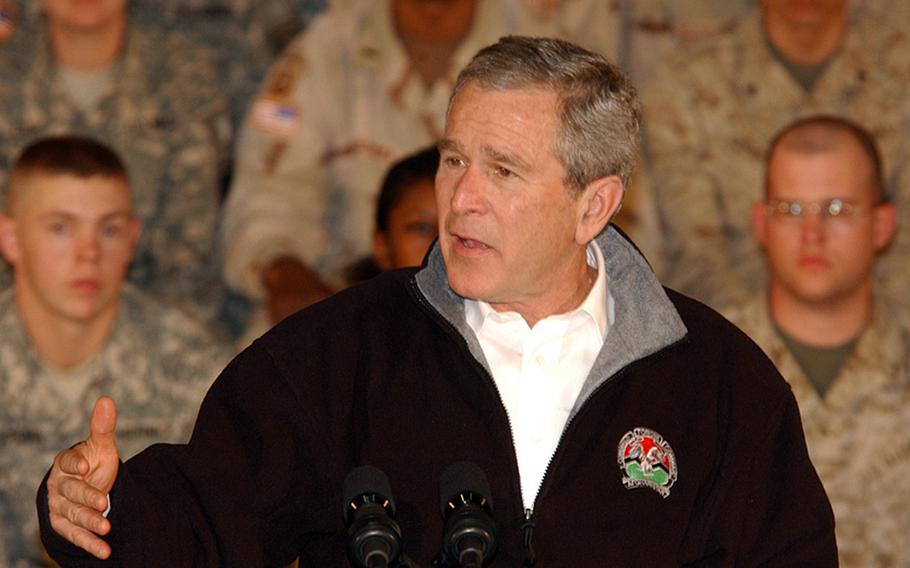
President George W. Bush speaks to a crowd of troops during a surprise visit to Bagram Airfield, Afghanistan, March 1, 2006. (Brian Schroeder/U.S. Army)
WASHINGTON (Tribune News Service) — George W. Bush, who ordered the 2001 invasion of Afghanistan to dislodge the Taliban and hunt down al Qaeda terrorists behind the Sept. 11 attacks, has watched the religious fundamentalists’ abrupt return to power with “deep sadness.”
Amid the chaotic scramble this week to evacuate U.S. personnel and Afghan allies, Bush refrained from directly criticizing President Joe Biden, the fourth president to oversee Afghanistan operations.
Biden insisted Monday that the United States had long ago accomplished the goals set out by Bush to degrade the terrorist threat, and had no business engaging in endless and potentially futile “nation-building.”
“Laura and I have been watching the tragic events unfolding in Afghanistan with deep sadness,” Bush said in a statement issued hours later. “Our hearts are heavy for both the Afghan people who have suffered so much and for the Americans and NATO allies who have sacrificed so much.”
The former president who now lives in Dallas warned last month that a U.S. withdrawal would be a “mistake” with “unbelievably bad” consequences that are playing out this week as Biden pressed ahead with a decision to end the 20-year combat mission – the longest war in American history.
“I’m afraid Afghan women and girls are going to suffer unspeakable harm,” Bush told German broadcaster Deutsche Welle last month, voicing concern also about the fate of Afghan interpreters and others who worked with U.S. forces. “They’re just going to be left behind to be slaughtered by these very brutal people, and it breaks my heart.”
Bush has largely refrained from speaking out since leaving office, making his rare interview with Deutsche Welle, from a family home in Kennebunkport, Maine, a sign of unusual dismay compared to this week’s more muted comments.
Congress never declared war in Afghanistan. But one week after hijacked planes slammed into the World Trade Center, lawmakers authorized Bush to pursue those responsible through military action.
Operation Enduring Freedom began Oct. 7, 2001.
President Donald Trump, who came to office vowing to end the war in Afghanistan, presided over a drastic drawdown of U.S. troops and struck a deal in February 2020 with the Taliban to leave by May 1 of this year.
In mid-April, Biden moved the deadline to Sept. 11 — the 20th anniversary of the hijackings that brought down the World Trade Center, arguing the United States had nothing to gain by prolonging involvement in an intractable civil war.
Bush campaigned against “nation-building” in 2000 but admitted later in his memoir, Decision Points, that “after 9/11, I changed my mind.”
By December 2001, the Taliban collapsed. Reconstruction soon began under U.S. control and on May 1, 2003, Bush’s defense secretary, Donald Rumsfeld, declared an end to major combat operations.
But the Taliban were far from defeated, and the civil and military institutions the United States nurtured since then collapsed spectacularly fast in recent weeks as the final U.S. drawdown came into view.
“The Afghans now at the greatest risk are the same ones who have been on the forefront of progress inside their nation. President Biden has promised to evacuate these Afghans, along with American citizens and our allies,” Bush said in his Monday night statement. “The United States government has the legal authority to cut the red tape for refugees during urgent humanitarian crises. And we have the responsibility and the resources to secure safe passage for them now, without bureaucratic delay.”
As first lady, and since her husband left office in 2009, Laura Bush has advocated fiercely for Afghan women, who under the Taliban were banned from leaving home without a male escort, or from working outside the home. Girls weren’t allowed to attend school.
The current Taliban leadership has promised somewhat more enlightened policies but concerns remain widespread.
Bush, in his statement, quoted women’s rights activist Dr. Sakena Yacoobi of the Afghan Institute of Learning, which has opened schools for girls and women around the country.
“While we are afraid, we are not defeated,” she wrote recently. “Ideas do not disappear so easily. One cannot kill whispers on the wind. The Taliban cannot crush a dream. We will prevail, even if it takes longer than we wanted it to.”
Bush also praised a generation of troops and diplomats who served in Afghanistan.
“You took out a brutal enemy and denied Al Qaeda a safe haven while building schools, sending supplies, and providing medical care. You kept America safe from further terror attacks, provided two decades of security and opportunity for millions, and made America proud. We thank you from the bottom of our hearts and will always honor your contributions,” he said.
“In times like these, it can be hard to remain optimistic. Laura and I will steadfastly remain so. Like our country, Afghanistan is also made up of resilient, vibrant people. Nearly 65% of the population is under 25 years old. The choices they will make for opportunity, education, and liberty will also determine Afghanistan’s future.”
©2021 The Dallas Morning News.
Visit dallasnews.com.
Distributed by Tribune Content Agency, LLC.